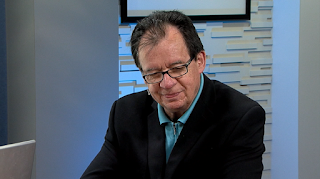"Momentum 21" gives Indianapolis Chamber Orchestra a bold claim on the cultural present and future here
You can get a lot of insight into the open-ended stance of classical music in the early 21st century by listening to "Momentum 21" (Albany), a new compact disc issued to mark the conclusion of Kirk Trevor's long tenure as music director of the Indianapolis Chamber Orchestra.
The disc is titled after the work that opens the program, "Triptych: Musical Momentum," by composer-in-residence James Aikman. Recorded at the ICO's home concert hall, the Schrott Center for the Arts at Butler University, "Triptych" is an inviting showcase for the ICO and its rapport with Trevor.
The three-movement work opens with a driving Fanfare, which holds something in reserve despite its insistent rhythmic patterns. Wisps of woodwind play off the dominant rhythm, which is punctuated by a hammer hitting a 2-by-4, manned by the timpanist, who gets the composition's last word on his proper instrument. The middle movement, "The Particle Garden," uses a steady electronic track supplementing the orchestra to lend a misty "wash" effect ensemble, which gently opens avenues toward a plain-speaking clarinet, joined by horns and harp, in something resembling the Americanist idiom of Aaron Copland. The finale "String Fields," has the most complex texture, unostentatiously well-managed and not disruptive to the open-hearted expression characteristic of Aikman's muse.
Of the other works, I was particularly struck by the virtuosity of Martin Kuuskmann as soloist in Christopher Theofanidis' Bassoon Concerto, the oldest work on the program (2002). There is virtuosity aplenty throughout its three movements. The striding self-assurance of the soloist, and the role he is required to play, dominate the first movement. "Oriental" figuration characterizes the bassoon role in the second movement, against the orchestra's meditative long-held notes. The perpetual-motion demands of the finale are smoothly handled by Kuuskmann, and the music's overall variety juxtaposes the ethereal and the earthy. With the bassoon topping and reconciling the wide range of orchestral sound, the piece fittingly ascends to a high, serene ending.
Almost as enthralling is Derek Bermel's Ritornello: Concerto Grosso for Electric Guitar and String Orchestra, the disc's other concerto. It's got a nice formal shape and showcases effectively a rarely used solo-concerto instrument. The sonic palette is attractive, with only strings in accompaniment, and it's broadly idiomatic to Derek Johnson's command of the guitar. I haven't heard such a successful new "classical" composition inspired by electric guitar since Mark-Anthony Turnage's "Scorched" for John Scofield.
Indicating that modernism of an expressionist bent isn't dead yet, "Lady Dark," Michael-Thomas Foumai's well-appointed orchestral outline to the emotional trajectory of Shakespeare's "dark lady" sonnets, is fascinating from first to last. The brief instrumental solos, particularly for flute, oboe, and clarinet, are nicely folded into the fabric. The complicated terrain covered includes foreboding unisons near the start and an episode of aggression in which the horns take over. Something like exhaustion — hinting at the inevitable listlessness that follows intensity in love — sets in until the full orchestra gains force once again, only to subside hauntingly near the end before a final "Basta!"
The recording amounts to a farewell tribute that will stand for something fresh and adventurous in Kirk Trevor's legacy as shaper of the ICO's artistic stature since 1988.
 |
| Kirk Trevor adds a significant recording to a large discography. |
Of the other works, I was particularly struck by the virtuosity of Martin Kuuskmann as soloist in Christopher Theofanidis' Bassoon Concerto, the oldest work on the program (2002). There is virtuosity aplenty throughout its three movements. The striding self-assurance of the soloist, and the role he is required to play, dominate the first movement. "Oriental" figuration characterizes the bassoon role in the second movement, against the orchestra's meditative long-held notes. The perpetual-motion demands of the finale are smoothly handled by Kuuskmann, and the music's overall variety juxtaposes the ethereal and the earthy. With the bassoon topping and reconciling the wide range of orchestral sound, the piece fittingly ascends to a high, serene ending.
Almost as enthralling is Derek Bermel's Ritornello: Concerto Grosso for Electric Guitar and String Orchestra, the disc's other concerto. It's got a nice formal shape and showcases effectively a rarely used solo-concerto instrument. The sonic palette is attractive, with only strings in accompaniment, and it's broadly idiomatic to Derek Johnson's command of the guitar. I haven't heard such a successful new "classical" composition inspired by electric guitar since Mark-Anthony Turnage's "Scorched" for John Scofield.
Indicating that modernism of an expressionist bent isn't dead yet, "Lady Dark," Michael-Thomas Foumai's well-appointed orchestral outline to the emotional trajectory of Shakespeare's "dark lady" sonnets, is fascinating from first to last. The brief instrumental solos, particularly for flute, oboe, and clarinet, are nicely folded into the fabric. The complicated terrain covered includes foreboding unisons near the start and an episode of aggression in which the horns take over. Something like exhaustion — hinting at the inevitable listlessness that follows intensity in love — sets in until the full orchestra gains force once again, only to subside hauntingly near the end before a final "Basta!"
The recording amounts to a farewell tribute that will stand for something fresh and adventurous in Kirk Trevor's legacy as shaper of the ICO's artistic stature since 1988.



Comments
Post a Comment